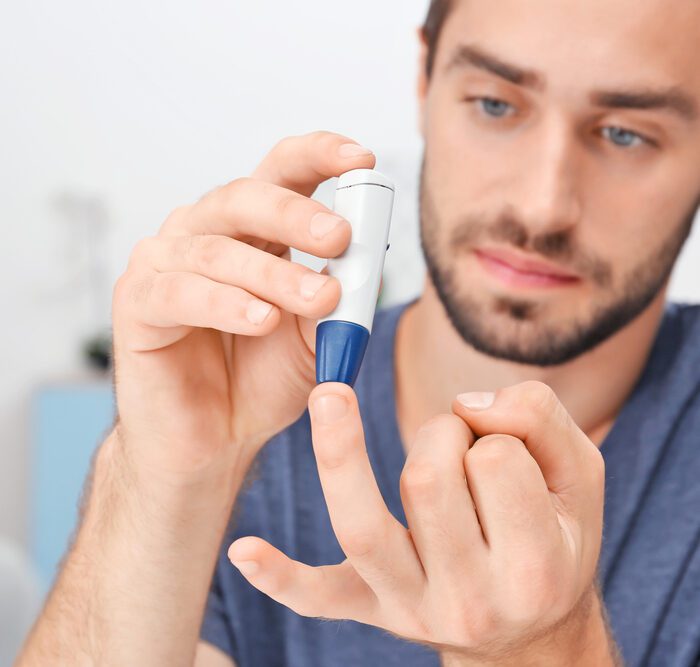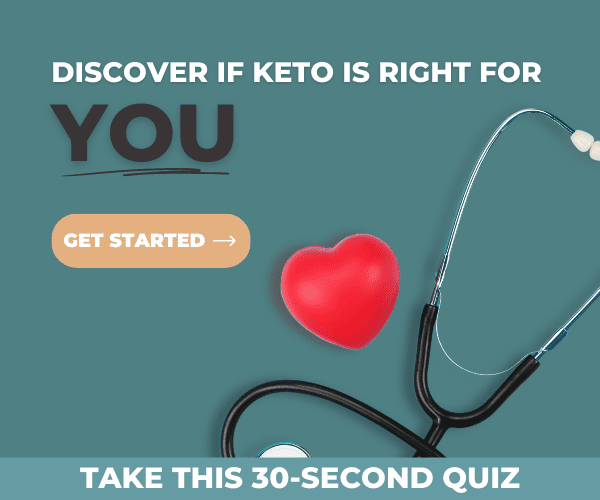Is Keto a Fad Diet? Why You Might Be Wrong

Is keto a fad diet? You may have asked yourself this question after learning about the quick weight loss that happens within weeks of cutting carbs and eating plenty of fat and protein instead.
If you do some digging, you’ll discover that the keto diet has been around since the 1920s as a treatment for epilepsy. [1] But even before the term “keto” came into existence, our ancestors were likely in ketosis, a fat-burning metabolic state, much of the time when food–especially high-carb food–wasn’t widely available.
With all the conflicting messages around the keto diet, it can be tricky for beginners to determine if it’s the right approach for their health and wellness. Let’s find out whether keto is a fad diet or not.
What Is a Fad Diet?
A fad diet is defined as something that promises fast and easy weight loss. In other words, a fad diet is a “quick fix” solution. A popular example would be a juice cleanse or juice fast in which a person consumes only vegetable and fruit juices for “detoxification.” Usually, fad diets only last for a while. More importantly, they’re not based on scientific research.
Some sources claim that fad diets are those that eliminate one or more of the 5 food groups, such as grains, fruits, vegetables, protein, and dairy. [2] However, these sources ignore the fact that some people do not respond well to certain foods and food groups due to intolerances and existing health conditions.
Take, for instance, whole grains. While whole grains are generally accepted as a health-promoting food, they can still raise blood sugar levels in people with diabetes and contain high amounts of lectins—antinutrients that interfere with nutrient absorption and contribute to leaky gut and other issues. [3]
Is Keto a Fad Diet?
The keto diet is not a fad diet, although it can be dismissed as a fad if done incorrectly. Done correctly, the keto diet is safe and healthy in the long-term. Unlike many fad diets, the ketogenic diet does not promise extreme weight loss very quickly, though it is an effective weight loss tool.
Keto is sometimes judged to be a fad diet by people who jump aboard the bandwagon without learning the basics of the diet, what to expect during the first few weeks, the best foods to eat and avoid, and how to break through a weight loss plateau.

A lot of people quit and then call keto “unsustainable” or “too restrictive” when they are not prepared for the keto flu. Others perhaps haven’t given themselves a chance to explore low-carb alternatives to carb-rich foods like starchy vegetables, pasta, and pastries to avoid micronutrient deficiencies and make their diet more enjoyable.
Like any approach that promotes health, the keto diet requires understanding, support from a knowledgeable and experienced healthcare provider (if you have a medical condition), and personalization to suit your individual needs and preferences.
In another article, we’ve shared the 3 biggest mistakes people make on keto. Reading this article may clear up common myths and show that the keto diet has important therapeutic benefits.
Recent Studies on the Keto Diet
Studies have demonstrated the effectiveness of the keto diet for preventing, slowing the progression of, and even reversing a variety of health problems. Below are a few of the latest studies to prove that keto transforms your body for the better.
Polycystic Ovary Syndrome (PCOS)
In polycystic ovary syndrome, women produce higher levels of male hormones and develop fluid-filled sacs in their ovaries—thus the term polycystic. The exact causes of PCOS are still unknown. However, carrying excess body weight, hyperinsulinemia, and insulin resistance—which results from too many carbs in the diet—play a role in the disease.
If you’re suffering from PCOS, a 2021 study suggests that the keto diet can be used as a non-pharmacological therapy. Using the 45-day keto protocol, which included animal proteins, whey protein isolate, nuts, and leafy vegetables, the subjects experienced a reduction in androgen levels. They also achieved weight loss, which improved PCOS outcomes. [4]
Type 2 Diabetes

Type 2 diabetes occurs when the body’s cells don’t respond normally to insulin, causing glucose levels to increase in the blood. Thanks to Virta Health’s research, we now know that type 2 diabetes can be successfully reversed through carbohydrate restriction.
In June 2022, they published their 5-year clinical trial results showing that patients do not have to rely on increasing medications. Positive outcomes included improvements in their hemoglobin A1C, triglycerides, HDL cholesterol, and inflammation markers. [1]
Non-Alcoholic Fatty Liver Disease (NAFLD)
Non-alcoholic fatty liver disease is characterized by the buildup of fat in the liver and is common in those who are overweight or obese. It’s not caused by alcohol intake, but it can lead to cirrhosis. As a result, people with NAFLD need to make changes in their lifestyle to prevent serious liver damage.
The keto diet addresses NAFLD by reducing risk factors, such as type 2 diabetes, insulin resistance, and metabolic syndrome. A 2020 study found that a short-term keto diet reverses NAFLD. Within 6 days, researchers noted a decrease in intrahepatic triglycerides (IHTG), weight loss, and increased insulin sensitivity. [6]
Polycystic Kidney Disease (PKD)
Polycystic Kidney Disease is an inherited kidney disorder that responds to a keto diet. Thomas Weimbs and colleagues conducted the first study in which they observed patients with the disease and found that keto caused improvements in the patients’ overall well-being, blood pressure, weight, kidney function, and cyst progression. [7]
Colorectal Cancer
Colorectal cancer, or colon cancer, starts as small polyps that grow slowly until they become large enough to cause symptoms. Being overweight or obese and eating a diet high in sugar are risk factors for this cancer.
According to a new study published in Nature, beta-hydroxybutyrate (BHB), a molecule (to be specific, a ketone body) produced during ketosis, slowed the growth of tumors in mice. [8] One of the researchers, Dr. Maayan Levy, stated that BHB activates Hopx expression, which then inhibits cell proliferation. [9]
Alzheimer’s Disease
Alzheimer’s Disease is a progressive neurologic disorder in which a person’s memory and thinking skills decline until they’re unable to carry out everyday tasks.
You may have heard of Alzheimer’s being unofficially referred to as type 3 diabetes. This is because the disease involves insulin resistance in the brain. The brain relies on glucose for fuel, but for Alzheimer’s Disease patients, glucose uptake and metabolism are impaired. [10]
A 2022 review article concluded that the keto diet or medium-chain triglycerides (MCT) supplementation can improve Alzheimer’s Disease symptoms and possibly prevent further cognitive decline. [11]
The Truth About the Keto Diet for Your Health and Wellness

You can see that there’s plenty of evidence showing that keto is not a fad diet. A diet heavy in carbs can be problematic, and cutting them from your diet and relying on ketones instead of glucose for fuel may help with the health conditions mentioned above as well as many others.
If you are new to the keto diet, it will help to do your research. Try learning from the experiences of others who have done it—why and how they got started, how long they’ve been on keto, and the changes they made on their journey. We encourage you to check out our Success Stories section and meet people whose lives have changed through keto!
FAQs
How long should a person stay on a keto diet?
You can stay on keto for as long as you’re experiencing its benefits. Since everybody is unique, you may find the need to experiment with different versions of keto as you progress. For instance, you might start with a standard keto diet, then transition to a cyclical keto diet where you increase carbs over the weekend to boost athletic performance.
Is the keto diet safe?
The keto diet is safe for most people, although certain medical conditions require the supervision of a doctor. These conditions include type 1 and type 2 diabetes, liver disease, kidney disease, and high blood pressure (taking medications).
Is ketosis like starvation?
The metabolic state of ketosis mimics starvation since there’s less glucose in the blood. In this state, the body burns stored fat, which produces ketone bodies, namely beta-hydroxybutyrate (BHB), acetoacetate (AcAc), and acetone (Ace).
What are common keto diet side effects?
Common side effects include flu-like symptoms, such as headaches, nausea, weakness, fatigue, and digestive issues. These symptoms are collectively called the “keto flu” and they’re only temporary. Learn more about the keto flu here and how to prevent it.
Do dieticians recommend keto?
The short answer is that some dieticians support and are experienced with the keto diet, while some don’t. The same goes for clinicians. If you’re looking for a healthcare provider that can help you on your keto journey, we recommend using our Doctor Finder tool. Just enter your location and sort by profession.
References
Wheless J. W. (2008). History of the ketogenic diet. Epilepsia, 49 Suppl 8, 3–5. https://doi.org/10.1111/j.1528-1167.2008.01821.x
FAD diets: Diet, types, tips. Cleveland Clinic. (2020, August). Retrieved January 9, 2023, from https://my.clevelandclinic.org/health/articles/9476-fad-diets
López-Moreno, M., Garcés-Rimón, M., & Miguel, M. (2022). Antinutrients: Lectins, goitrogens, phytates and oxalates, friends or Foe? Journal of Functional Foods, 89, 104938. https://doi.org/10.1016/j.jff.2022.104938
Cincione, R. I., Losavio, F., Ciolli, F., Valenzano, A., Cibelli, G., Messina, G., & Polito, R. (2021). Effects of Mixed of a Ketogenic Diet in Overweight and Obese Women with Polycystic Ovary Syndrome. International journal of environmental research and public health, 18(23), 12490. https://doi.org/10.3390/ijerph182312490
Virta Health. (2022, June 5). Virta health highlights lasting, transformative health improvements in 5-Year Diabetes reversal study. Virta Health. Retrieved January 9, 2023, from https://www.virtahealth.com/blog/virta-sustainable-health-improvements-5-year-diabetes-reversal-study
Luukkonen, P. K., Dufour, S., Lyu, K., Zhang, X. M., Hakkarainen, A., Lehtimäki, T. E., Cline, G. W., Petersen, K. F., Shulman, G. I., & Yki-Järvinen, H. (2020). Effect of a ketogenic diet on hepatic steatosis and hepatic mitochondrial metabolism in nonalcoholic fatty liver disease. Proceedings of the National Academy of Sciences of the United States of America, 117(13), 7347–7354. https://doi.org/10.1073/pnas.1922344117
Sebastian Strubl, Simon Oehm, Jacob A Torres, Franziska Grundmann, Jazmine Haratani, Morgan Decker, Sabrina Vuong, Amrit Kaur Bhandal, Nils Methot, Rhianna Haynie-Cion, Franziska Meyer, Florian Siedek, Uwe Korst, Roman-Ulrich Müller, Thomas Weimbs. Ketogenic dietary interventions in autosomal dominant polycystic kidney disease—a retrospective case series study: first insights into feasibility, safety and effects, Clinical Kidney Journal, Volume 15, Issue 6, June 2022, Pages 1079–1092, https://doi.org/10.1093/ckj/sfab162
Penn Medicine News. (2022, April 27). “Keto” Molecule May Be Useful in Preventing and Treating Colorectal Cancer, Penn Study Suggests. Pennmedicine.org. Retrieved January 9, 2023, from https://www.pennmedicine.org/news/news-releases/2022/april/keto-molecule-may-be-useful-in-preventing-and-treating-colorectal-cancer-penn-study-suggests
Lennon, A. (2022, May 12). Reversing colorectal cancer: Keto Molecule shows promise. Medical News Today. Retrieved January 9, 2023, from https://www.medicalnewstoday.com/articles/keto-molecule-may-help-reverse-colorectal-cancer
Szablewski L. (2021). Brain Glucose Transporters: Role in Pathogenesis and Potential Targets for the Treatment of Alzheimer's Disease. International journal of molecular sciences, 22(15), 8142. https://doi.org/10.3390/ijms22158142
Lilamand, M., Mouton-Liger, F., Di Valentin, E., Sànchez Ortiz, M., & Paquet, C. (2022). Efficacy and safety of ketone supplementation or ketogenic diets for alzheimer's disease: A mini review. Frontiers in Nutrition, 8. https://doi.org/10.3389/fnut.2021.807970










